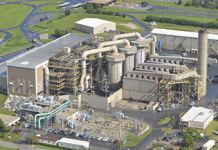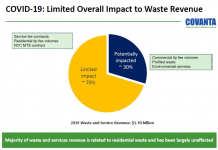In large part, the transition to clean energy will involve using our resources much more efficiently than we do now. One large potential feedstock for biofuels (and arguably the only one which is truly sustainable) is our trash. As the world economy grows, and the available stock of natural resources diminishes, society will have no choice but to use what we have more efficiently and throw less of it away.
In addition to the now familiar recycling of Aluminum, glass, cardboard, paper, and plastic, yard and construction waste will find its way to cellulosic ethanol plants, and used cooking oil will be transformed into biodiesel. Formerly problematic hazardous waste such as electronics will be reused, and what can’t be reused will be mined for increasingly valuable (and toxic) elements they contain.
 One company likely to be at the center of many of these trends is Waste Management, Inc. (NYSE: WMI.) As the United States’ largest trash hauler and recycler, they are in the enviable position of being paid to collect potentially valuable material. Growth in recycling need not be a drain on earnings, since in many cases, recycling programs simply allow them to enlist customers to help them segregate recyclables from other waste, or to offer higher value-added services such as single-stream recycling. It’s clear that management understands these trends, having adopted "Think Green" as the company slogan, and has put new emphasis on recycling and Waste-to-Energy divisions. Even if the initial motivation was the urge to greenwash, the opportunity for profit has not been lost.
One company likely to be at the center of many of these trends is Waste Management, Inc. (NYSE: WMI.) As the United States’ largest trash hauler and recycler, they are in the enviable position of being paid to collect potentially valuable material. Growth in recycling need not be a drain on earnings, since in many cases, recycling programs simply allow them to enlist customers to help them segregate recyclables from other waste, or to offer higher value-added services such as single-stream recycling. It’s clear that management understands these trends, having adopted "Think Green" as the company slogan, and has put new emphasis on recycling and Waste-to-Energy divisions. Even if the initial motivation was the urge to greenwash, the opportunity for profit has not been lost.
As the largest operator of landfills in the US, Waste Management is also in the enviable position of managing large, renewable sources of natural gas. Landfill gas, unlike many other forms of renewable energy can provide baseload electricity, or, with the addition of gas storage, dispatchable power. In addition to these advantages, the cost to produce electricity from landfill gas is price competitive with conventional electricity generation. Waste Management has been aggressively collecting landfill gas at more landfills around the country, and has even developed technology to accelerate decomposition and methane production in bioreactor landfills.
Waste Management has seen decreasing trash volumes over the last two years, in large part due to the slowing economy, especially the construction sector. Despite this, they have been able to use their pricing power and cost slimming to increase their profits per share over that same period. The prices of recycled commodities, like all commodities have also been robust over the same period. If waste volumes cease to decline, and the prices of recycled commodities continue to rise (which I expect, although they are predicting flat pricing for recycled commodities), they should see excellent profit improvement over the next few years.
Finally, WMI management feels that they have already seen most of the decline that they expect from a slowing economy, and they have been able to weather that decline well by aggressively cutting costs. Any rise in volumes due to an uptick in economic activity should be multiplied in increased profits. For the longer term, existing landfills may be the source of much more revenue than just landfill gas. The first step in using resources more efficiently will be recycling rather than sending them to landfills. Further in the future, we may see actual mining of old landfills, recovering the trash of yesteryear for the products of tomorrow.
Click here for other articles in this series.
DISCLOSURE: Tom Konrad and/or his clients have long positions in WMI.
DISCLAIMER: The information and trades provided here are for informational purposes only and are not a solicitation to buy or sell any of these securities. Investing involves substantial risk and you should evaluate your own risk levels before you make any investment. Past results are not an indication of future performance. Please take the time to read the full disclaimer here.







